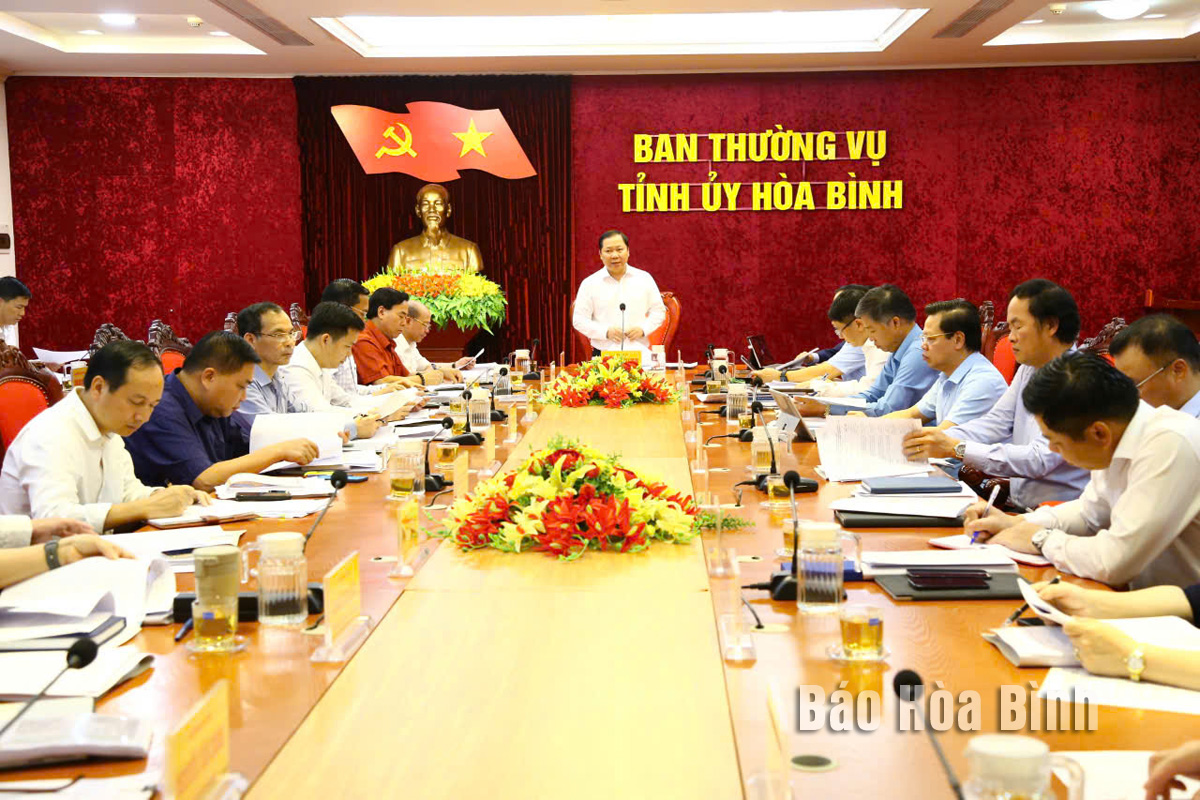
Hoa Binh province’s steering board for implementing the plan on preserving and promoting the values of the Muong ethnic culture and the Hoa Binh Civilisation during 2023 - 2030 held a meeting on November 6 to review the plan implementation. The event was chaired by Nguyen Phi Long, alternate member of the Party Central Committee, Secretary of the provincial Party Committee, and head of the steering board.
Nguyen Phi Long, alternate member of the Party Central
Committee, Secretary of the provincial Party Committee, addresses the meeting.
In the recent past, the communications and
introduction of the values of the Muong ethnic group’s culture and the Hoa Binh
Civilisation have been promoted on mass media outlets. Agencies, units, and
localities have built schemes for carrying out the plan.
In particular, more attention has been paid to
the preservation and promotion of intangible cultural heritage. Hoa Binh has
coordinated with the Vietnamese Institute for Musicology and the People’s
Committees of relevant provinces and cities to compile a scientific dossier
submitted to UNESCO to seek the inscription of "mo Muong” into the list of
intangible cultural heritage in need of urgent safeguarding.
The province has also boosted the survey and
collection of intangible cultural heritage of the Muong ethnic minority. So
far, four intangible cultural heritage elements of Muong people have been named
national ones, and dossiers on two others are being submitted for recognition.
Efforts are being made to restore and preserve some typical traditional
festivals of Muong people. In addition, authorities are also working with the
education and training sector to boost the teaching of the Muong ethnic script.
Regarding the Hoa Binh Civilisation, the
province proposed the Prime Minister list the Trai hamlet cave in Tan Lap
commune and the Vanh village stone shelter in Yen Phu commune (Lac Son
district) as special national relic sites. Departments and sectors have been
working with the Lac Son People’s Committee to build a plan on rehabilitating
those two sites. Besides, coordination with the Institute of Archaeology has
also been enhanced to survey and research archaeological relics of the Hoa Binh
Civilisation.
At the meeting, participants discussed
difficulties and obstacles to the plan implementation.
Nguyen Phi Long, alternate member of the Party
Central Committee and Secretary of the provincial Party Committee, said the
plan has been carried out methodologically over the past year, with certain
encouraging results recorded.
However, as cultural value preservation and
promotion is a tough task with a heavy workload, he requested the provincial
People’s Committee order related units and localities to invest more efforts in
performing the duties for 2024.
The preservation and promotion of cultural
values requires the engagement of the entire political system, he said, adding
that it is necessary to connect the work with tourism development, pay due heed
to the personnel in charge of preserving the Muong ethnic culture and the Hoa
Binh Civilisation, and earmark part of the local budget for cultural affairs.
The Standing Board of the Hoa Binh provincial Party Committee has agreed in principle on a proposal by the Standing Board of the Party Committee of Hoa Binh city to gather feedback on the city’s 1:2000 zoning plan, which forms part of its broader urban development strategy.
Hoa Binh province has made notable progress in public administration reform and digital government development, with the satisfaction index among citizens and businesses reaching over 84%, according to recent government evaluations.
Thanks to great efforts by local authorities in recent times, the governance and public administration performance of Mai Chau district has been significantly improved.
In the afternoon of June 6, the Party Committee, the People's Council, the People's Committee and the Fatherland Front of Lac Son district solemnly held a meeting to celebrate the 139th anniversary of the district's founding (1886–2025) and the 79th anniversary of the establishment of the district's Party Committee (1946–2025). There was the attendance of Mr. Bui Van Thang, the Vice Chairman of the Provincial People's Council; Mr. Quach Tat Liem, the Vice Chairman of the Provincial People's Committee; Ms. Dang Bich Ngoc, the Deputy Head of the National Assembly Delegation of the province; as well as the former leaders of the province and district through various periods, who are the natives of the district.
Implementing the Politburo’s Resolution No. 57-NQ/TW on breakthroughs in science – technology, innovation, and digital transformation is a golden opportunity for the northern mountainous province of Hoa Binh to renew growth model, improve competitive edge and shorten digital gap.
Resolution 57-NQ/TW, issued by the Politburo on December 22, 2024, identifies sci-tech, innovation, and digital transformation as strategic breakthroughs to build a developed and prosperous nation. In Hoa Binh province, this spirit is not just a slogan, it’s being put into action through concrete initiatives that form a "new development triangle”: digital citizenship, digital economy, and digital administration.



